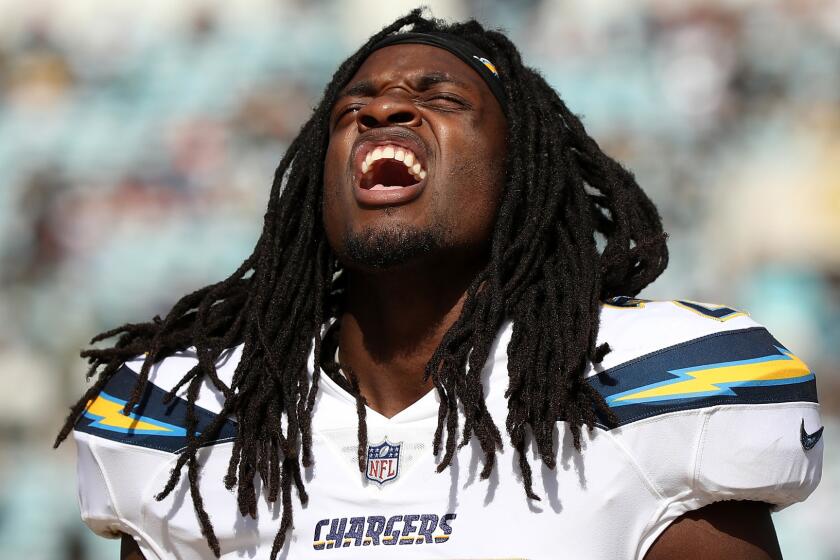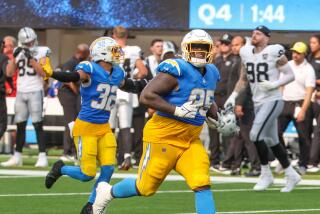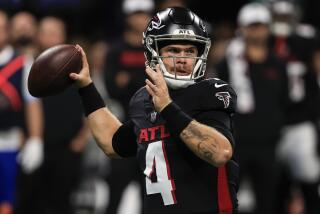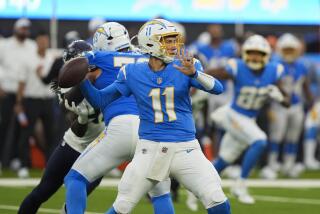Chargers’ Russell Okung survived ‘near-death’ experience after blood clot in lung
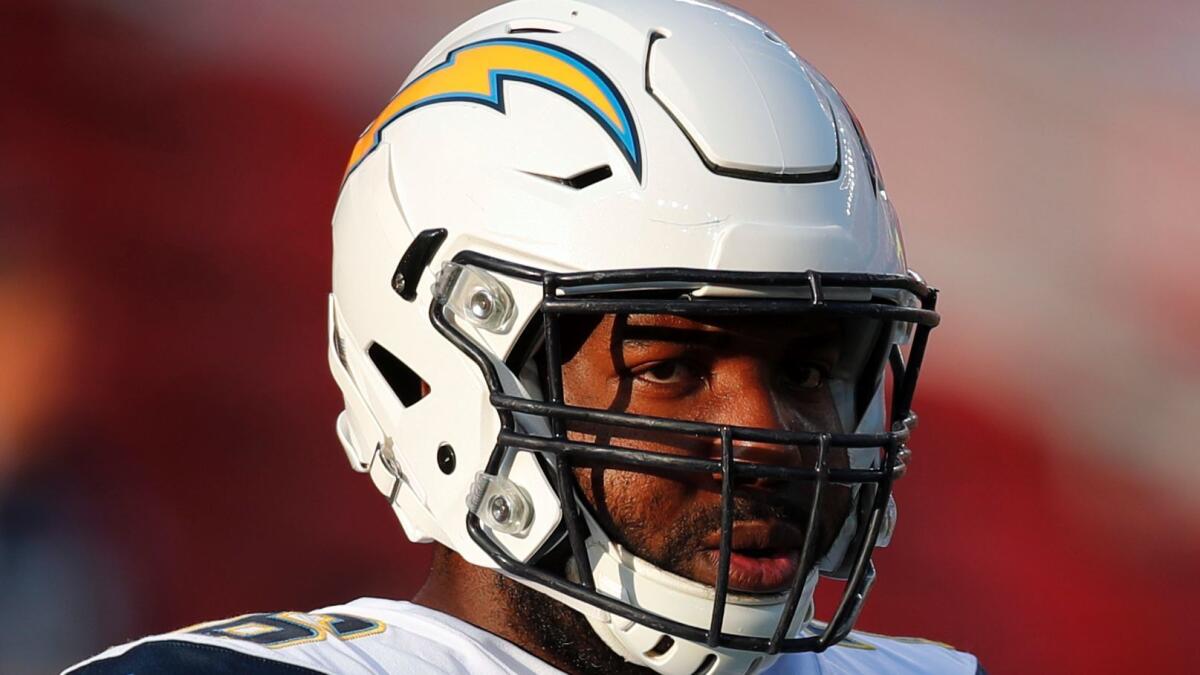
Russell Okung spent the opening day of Chargers training camp Thursday mostly working on his own, hours after revealing he recently survived a “near- death type experience.”
In a social media post, the team’s starting left tackle wrote that he suffered a pulmonary embolism on June 1. The Chargers placed Okung on the non-football injury list Wednesday.
“After experiencing unusual chest pains at practice … I went to urgent care out of an abundance of caution,” the post read. “According to the doctors who treated me, the decision to do so likely saved my life.”
Okung didn’t speak with the media following practice, instead choosing to let his statement stand.
“All injuries are serious,” quarterback Philip Rivers said. “But we’re used to the ankles and knees and all those things. They are tough to deal with … But this is even … It’s one of those silent-and-deadly deals.”
Okung wrote that the embolism was caused by blood clots. He added that, when detected early, the condition is “very treatable.” A pulmonary embolism occurs when an artery in the lungs is blocked by a blood clot.
The Chargers do not have a timetable for Okung’s return and are preparing for the prospect that he could miss at least training camp, which runs through Aug. 16 in Costa Mesa.
The Chargers will open training camp Thursday without both running back Melvin Gordon and left tackle Russell Okung, two key pieces on offense.
“I’m feeling great physically,” Okung wrote. “It’s not an ankle or a shoulder. As soon as doctors clear me, my plans include blocking #17’s blind side all the way to Miami.”
Rivers wears No. 17 for the Chargers and Miami is the site of the Super Bowl.
Okung, 31, is a two-time Pro Bowler entering his 10th NFL season and third with the Chargers. He is one of their highest-paid players with a base salary of $13 million in 2019.
“Russell, he has it all figured out,” center Mike Pouncey said. “He’s been in the league for a long time. He’s made a lot of money. He’s had a lot of success throughout his career. Right now, we just want him to get as healthy as possible.”
Okung will attend practices and meetings while awaiting medical clearance. Coach Anthony Lynn jokingly said of Okung, “Right now, he’s an assistant coach.”
In his absence, starting right tackle Sam Tevi has switched sides and Trent Scott has assumed Tevi’s spot. Guards Michael Schofield and Forrest Lamp also have experience at tackle.
“Thankfully, as he said, he’s getting the treatment,” Rivers said. “He caught it soon enough. He seems to be in great spirits … When he’s healthy, which is most important, we’ll get him back out here.”
Is Gordon like Bell?
During a 2018 holdout that eventually lasted the length of the season, running back Le’Veon Bell heard plenty of criticism, including some from his own locker room in Pittsburgh.
With Melvin Gordon now a no-show at Chargers camp, at least one of his teammates doesn’t foresee similarly unpleasant circumstances unfolding.
“That situation was definitely different,” cornerback Casey Hayward said of Bell. “He was [franchise] tagged twice … At the same time, we gotta focus on the guys that are here and wish him well. Hopefully, that can get resolved and everything can go back to normal.”
Gordon is scheduled to make $5.6 million in the final season of a five-year contract he signed after the Chargers moved up in the 2015 draft to take him 15th overall.
He is seeking a deal more in line with the NFL’s highest-paid running backs. The top three — Bell, Todd Gurley and David Johnson — all have annual average base salaries of at least $13 million.
The collective bargaining agreement allows for the Chargers to fine Gordon up to $40,000 per day during his absence.
Two weeks ago, Gordon’s agent informed the team that his client would not report to camp and would demand a trade if a new deal wasn’t in place by Wednesday.
For now, general manager Tom Telesco has dismissed the notion that the Chargers would consider trading Gordon.
“We don’t like to talk about players that are not here,” Lynn said after practice Thursday. “We understand his situation. We love Melvin. We’re a good football team with Melvin. But he’s not here.”
Given the makeup of the Chargers’ roster, Hayward said he doesn’t think Gordon’s situation will adversely impact preparations for the season.
“We’re got a veteran team,” Hayward said. “So I don’t think it will be any distraction. We’ll let the organization and Melvin handle that.”
Said Rivers: “We love Melvin. But we’re going to go with what we’ve got. And it’s a pretty dang good group.”
Feeney tries center
Starting left guard Dan Feeney took some snaps at center Thursday. Lynn said the idea is to promote versatility along the offensive front.
“When you play on the offensive line, you need some position flex,” he said. “Dan Feeney was going to be our starting center before Mike Pouncey became available [in March of 2018]. So it’s not foreign to him.”
Lamp, a 2017 second-round pick who has been slowed by a knee injury, alternated at guard with both the first and second teams.
More to Read
Go beyond the scoreboard
Get the latest on L.A.'s teams in the daily Sports Report newsletter.
You may occasionally receive promotional content from the Los Angeles Times.

